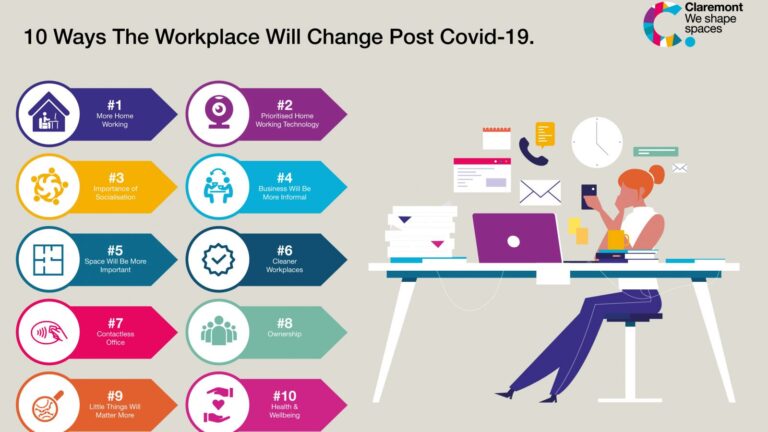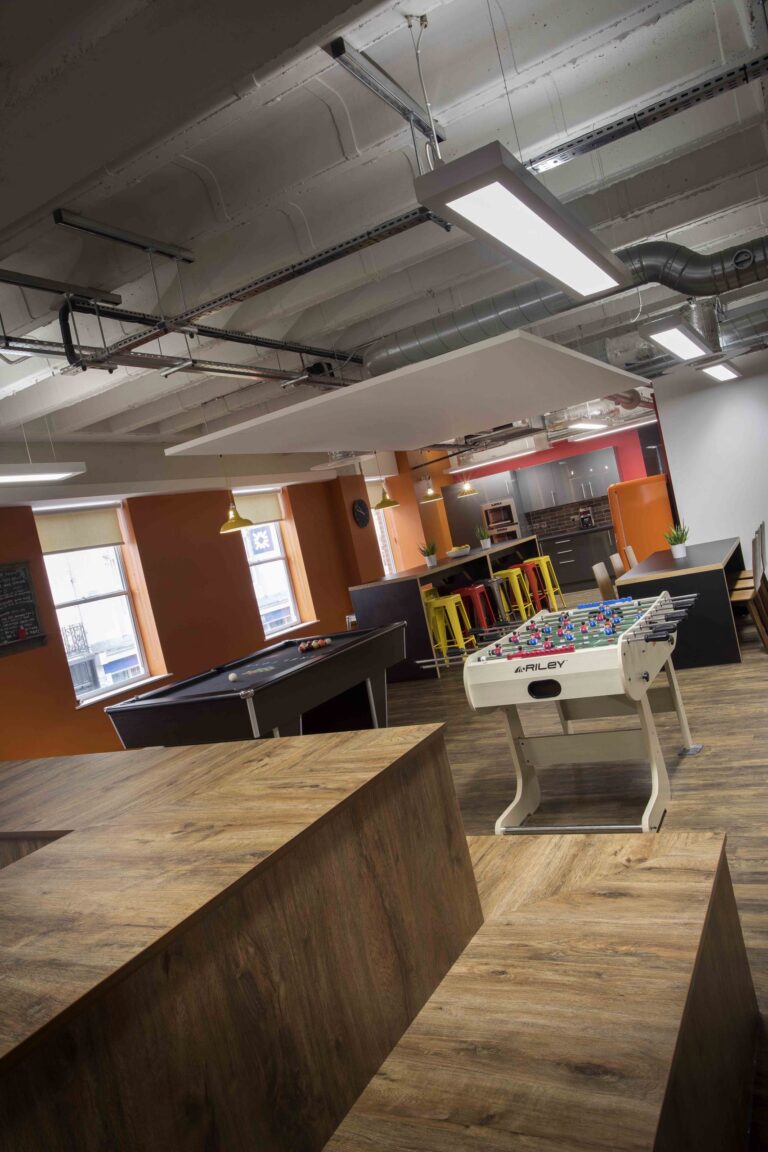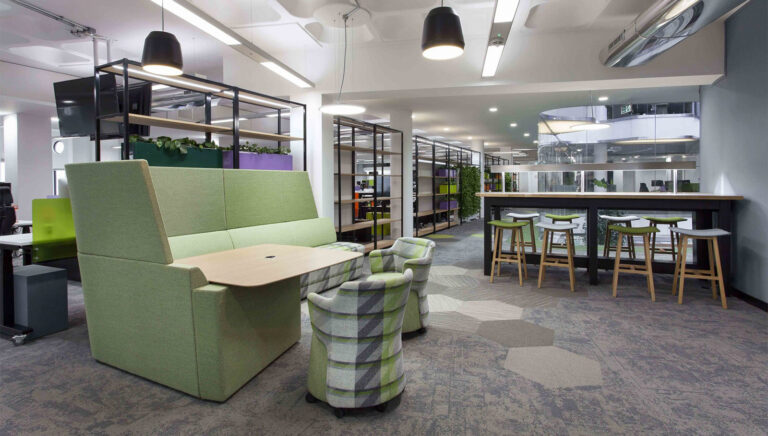
Our view: 10 things that might change in the workplace post Covid-19
Date
27 July 2020
Read length
5 min
As Director of Future Workspace at Claremont Group Interiors, Ann Clarke, I have recently been asked about my thoughts on how the future workspace will change as a result of the current Covid-19 pandemic.
In this current climate the world has changed temporarily, but the world of work has changed permanently.
With businesses across the globe having to flick the switch to home working in a matter of days and weeks due to the Coronavirus pandemic, change has been a revolution not evolution. Organisations that either didn’t have the appetite or the belief to work in an agile way have now been forced to change, and whilst working environments are still set up for traditional working, the employees that will return to work are not. Humans adapt to change quicker than organisations, the challenges are for workspaces to keep up with the speed of this change. Whilst change at a practical level within the workplace will be important, it will be the cultural shift in the relationship between organisations and their people which will have the biggest impact.
My top 10 predictions:
1 We will be able to work more from home, much more
We have shown that:
“I can work from home”
“Actually, if I’m disciplined and equipped, it’s not so bad”
“I can use technology to stay in touch, I don’t always need to meet face to face”
An enforced paradigm shift in how we do business has sped up the acceptance and necessity of remote working for the masses. Employees with the right kit, support and training have enabled business as usual scenarios for their organisations. Many are seeing the benefits, and navigating the downsides of home working in
2 Organisations that didn’t prioritise home working technology, if they still exist, will
Those organisations that previously invested in remote working technology stand a better chance of surviving. Even previously office-centric businesses such as contact centres have had to rapidly adapt to facilitating home working along with the hardware and data protection issues this brings, and most have. This could significantly impact both the future thinking around property portfolios and accessing a wider talent pool, extending jobs to those who need or choose to stay at home.
3 Socialisation is really important
Not seeing your colleagues face-to-face, no matter how good the remote communicating technology, is an issue. The serendipitous chats at the coffee machine, the banter and the ability to ask a quick opinion are valuable parts of the social glue that binds teams together at work.
Enlightened organisations understand that informal office social gathering in the tea point, lunchroom or canteen is as an important part of the team bonding and business building process. For younger generations, the social aspects of the workplace are of heightened importance to supplement highly virtual interactions.
When this is over, we will want to reconnect with our colleagues more than ever.
4 Business will be more informal
Once you have seen your boss, or even a client, in a hoodie in their kitchen, with their kids/ dog/ domestic help in the background and the general detritus of family life around them your working relationship can’t ever be the same again.
The acceptance, in these most exceptional of circumstances, of a more informal, almost intimate collaboration style with clients and colleagues is helping to break down some long-held business formalities. Our make-it-up-as-we-go-along approach to organisational continuity may herald a new attitude that continues in a post-virus, recession era business world.
Increasing de-formalisation in the workplace may exponentially gain traction across sectors that have previously side-stepped wider social trends.
5 Space will be important
Social distancing will have had a big impact on our psyche. Will we now feel so comfortable in a crowded lift or train? At work circulation spaces may become wider, lift capacity be more passenger restricted, desk spacing may widen. Personal space and control of that space will be important to many. This will be a difficult balancing act as organisations seek to ride a possible bumpy recession by looking to optimise their people and property outlays. Space and the perception of space will be a priority.
6 The workplace will be cleaner – and tidier
Not only will the workplace need to be seen to be cleaner with regular cleaning down of surfaces in kitchen and tea points throughout the day, not just at night, but employee etiquettes around respecting and maintaining cleanliness in the office will have to be revisited and enforced.
For some organisations this will also be the perfect excuse to tidy up the detritus of office life, the dust and dirt associated with files and redundant paperwork can be cleared away to improve the air quality and free up space to be used more effectively.
7 Contactless office
Minimising contact with surfaces will become more important; powered doors, sensor taps, iPhone-controlled coffee machines and access control systems will become more mainstream. Naturally bacteria controlling and impregnated materials will be deployed where necessary to reduce infections. Will the business handshake ever be the same again?
8 Ownership
‘Ours to share’ is the mantra of the agile office environment. Will we still want to share so much post Covid-19? Will the reassurance of our own dirt on our own keyboard and mouse, our own task chair and ultimately our own desk become more important not only emotionally but hygienically? Mobile personal technology will be vital to enable a new type of personalised agility. Belonging through ownership may change the landscape of the workplace.
9 The Little things will matter more
Friction free working practices; enabling workers to optimise their workplace experience and leverage their efficiency to increase innovation and productivity has long been the holy grail in workplace. Now more than ever, the experiential side of the workplace will have increased resonance with workers. Employers must provide uplifting working experiences, coming back to work should be a pleasure. Good coffee and tea, healthy snacks, a robust health and mobility plan access to natural light and fresh air should be a priority to lift spirits and help rebuild teams.
10 Health and wellbeing
Ultimately, what this sorry episode may bring home to many is that, above all, what really matters is the health of ourselves and the ones we love.
With an enforced period of reflection, people may be questioning the long working days, the stress, missing out on family time, the travelling and sedentary working behaviours. The research tells us that a healthy workforce delivers better outcomes. Individuals in an emotionally good place are better employees to the business and to one another. Organisations that support their people to live healthily and adapt their systems and processes to deliver better and healthier experiences for their staff will reap the benefits.
See how we could help with your new office interior design or office design and build project here
Get in touch
We love nothing better than talking all things workplace and design – got a question, potential project or just need some guidance?
Drop us a note…



